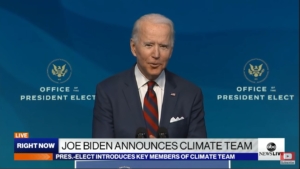What’s on TAP for Energy and Financial Services?
Here’s What You Need to Know
As we approach Inauguration Day, eyes turn to what key industries can expect as Donald Trump takes office. As part of Delve’s The Administration Project (TAP), we have been analyzing and assessing the incoming administration’s personnel choices and policy cues to determine just that.
This week, we released two of four summaries of our insights:
- Energy Surprises: During the campaign, the President-elect was bullish in his advocacy for expansion of domestic energy production through deregulation and a focus on oil, natural gas, and coal. Thus far, his Cabinet picks have tracked well with that goal. But, outside political and market forces, like state regulators crucial to oil and natural gas pipeline expansion, along with the energy market’s preference for natural gas over coal, may create roadblocks to achieving everything the new Administration has in mind. Likewise, renewable energy sources may not be as DOA in the new administration as some observers think, given incoming Energy Secretary Rick Perry’s record in Texas.
- Financial Services Fights: Between the President-elect’s campaign rhetoric and the number of Wall Street veterans in his Cabinet, it’s difficult to pin down where the new Administration is likely to fall on issues important to the financial services industry. It also remains unclear how much of a priority items like regulating the growing fintech industry, addressing the regulations in Dodd-Frank, and the Labor Department’s “fiduciary rule,” are to the new Administration. The only thing that is clear on these issues? The battle lines are being drawn with conflicts likely to play out over the next four years, both within the industry, and the administration.
For a more comprehensive look at how the new Administration will impact these industries, check out our blog posts “What’s On TAP for Energy” and “What’s On TAP for Financial Services.” Also, don’t forget to subscribe to TAP for weekly updates on the new Administration and access to custom research on-demand.
Subscribe to Receive Insights
"*" indicates required fields
News You Can Use
MISSING FROM OBAMA’S FAREWELL
President Obama’s farewell address was half victory lap for his claimed accomplishments and half call to action for his supporters. Business columnist Caroline Baum recently predicted which key elements of the Obama legacy wouldn’t make the cut for Tuesdaynight’s speech. For the most part she was spot on, correctly predicting the President would fail to omit the fact that the economic expansion beginning in 2009 has been the weakest since World War II, the President’s failure to transfer his personal popularity to the rest of his party, the disengaged strategy the U.S. has taken in foreign policy over the past eight years, and his administration’s active avoidance of addressing radical Islamic terrorism. While President Obama did bring up the topic of race relations, claiming they have improved during his tenure in office, most Americans disagree with that assessment. These facts show the difficulty facing Obama in framing his legacy when many Americans rejected his policies and chosen successor at the polls just a few months ago.
INTERNATIONAL RACES TO WATCH IN ‘17
Foreign policy expert Kevin Lees recently outlined several key elections around the world to watch for indications of any continuing patterns of changing global political dynamics. Referendums on current regimes will (or are likely to occur) in India with provincial legislative assembly elections, Mexico’s state gubernatorial election, and Venezuela’s regional and municipal elections along with a possible presidential recall vote. Several parliamentary and presidential elections throughout Western Europe – including those in France, The Netherlands, Germany, and Italy – will be major tests of whether the EU continues to see populist nationalism grow as it did in 2016. The makeup of the new Politburo in China, while not technically an election, will offer insights into how the country plans to navigate a Trump-led Unites States. How these elections unfold could have a significant impact on how the incoming Trump administration approaches bilateral and multilateral issues around the globe.
EURO-REGULATORS’ NEXT TARGET: DATA
Regulators, especially those in Europe, are looking at the data capabilities of big tech firms like Google and Facebook as a possible target for future regulations. Policymakers and academics have suggested the advantages these companies’ data resources give them could represent a barrier to entry for other companies and stifle possible innovation and competition. Opponents of the growing EU regulatory regime have pointed out how potential new rules could punish companies as they seek to use data to improve service for users, serving as a major hindrance to the burgeoning field of artificial intelligence technology that requires large sets of data to be effective. This policy area may well be the next major antitrust policy fight between global tech firms and the EU, which has already targeted companies like Apple, Amazon, and Google for various allegedly anti-competitive practices.
AMBULANCE EMERGENCY
Dr. Geoffrey Hosta, a 30-year veteran emergency room doctor, recently published a piece sounding the alarm on the serious, growing issue of “ambulance waste.” Patients are using ambulances who do not medically need them, resulting in regular instances of such vehicles not being available for serious, life-threatening injuries they are meant to respond to. Hosta enumerated instances of ambulance waste ranging from stubbed toes, to minor ankle sprains, to an alcoholic who requested an ambulance every day because the hospital was near his favorite liquor store. Cities are considering a range of policies to solve this problem, including projects to allow doctors to use tablets to video chat with patients, processes where 911 dispatchers can determine the necessity of an ambulance, and apps that could allow paramedics to video chat with patients who request their services. As the devil would be in the details to any such policies, look for tech innovators to introduce solutions to ambulance waste that may have larger value throughout the healthcare market.
HOW TRUMP’S TRADE BATTLE IS, AND ISN’T, LIKE REAGAN’S
In a recent Wall Street Journal op-ed, Holman Jenkins Jr. traces President-elect Trump’s current war against Detroit automakers who seek to move auto manufacturing overseas back to the Reagan trade policies of the 1980’s (spearheaded by people like Robert Lighthizer, who was recently nominated to be U.S. Trade Representative). Trump, much like Reagan, secured the election thanks largely to the support of blue-collar American workers, like those in the auto industry. Both men made promises to protect these workers’ jobs. But whereas Reagan waged his trade war against Japanese automakers, Trump must wage his against many U.S. auto manufacturers themselves. Jenkins points out that Trump’s criticism has focused exclusively on the exportation of jobs related to the manufacturing of less profitable small-car assembly, and stayed away from the more profitable business of exporting American-built SUVs to foreigners. Between that and reportedly strong signals that compliance by automakers will be rewarded with a relaxation of the Obama administration’s fuel mileage standards, Detroit could see brighter days ahead even as it is buffeted by the tumultuous winds of Trump tweets.
Mark Your Calendar
Friday, January 20 – Inauguration Day
Tuesday, January 31 – Year-End Federal Campaign Finance Reports Due



